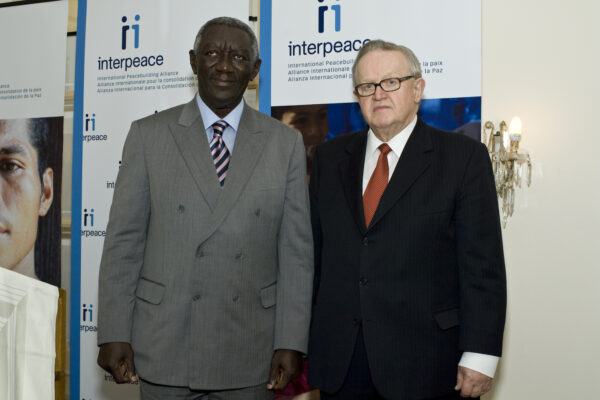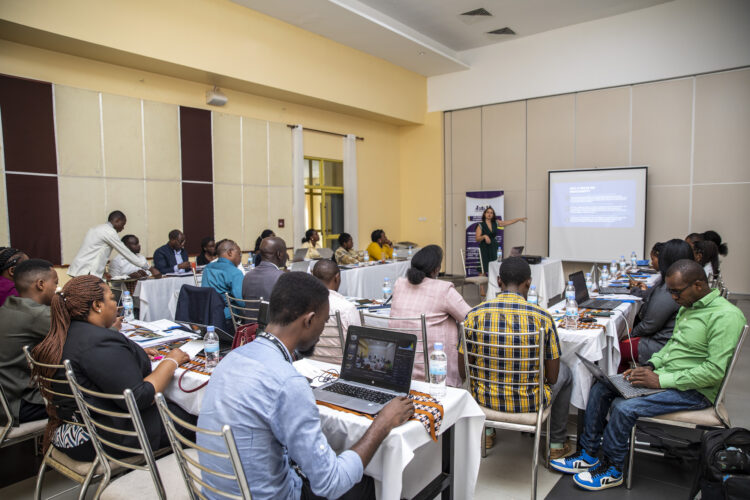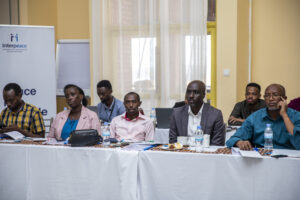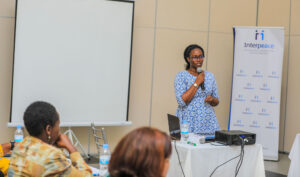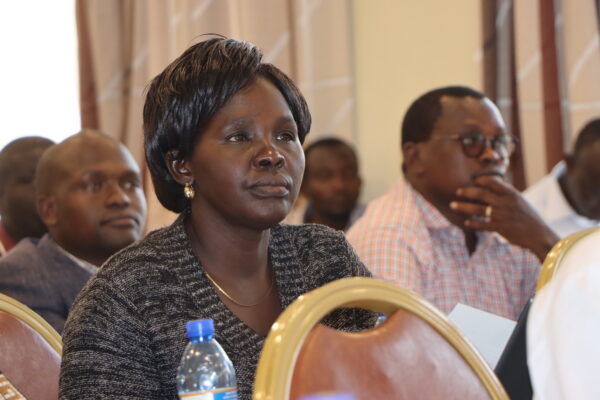Poor parenting skills, lack of communication between family members and negative gender norms affect family cohesiveness and community cohesion. The baseline survey conducted by Interpeace in 2021 to inform its four-year holistic peacebuilding programme in Rwanda, revealed that they further contribute to exacerbating family conflicts and gender-based violence (GBV), thus tearing apart families.
The study identified four primary forms of GBV, including physical, economical, sexual, and psychological, experienced by both women/girls and men/boys across five districts, which cause family dysfunction and increase alcohol or drug abuse and delinquency among young adults. They also affect the socio-economic development of families and communities.
Interpeace and its partners, together with the Rwanda Men’s Resource Centre (RWAMREC), developed a curriculum that promotes positive masculinity and positive parenting norms and practices, targeting couples, older adolescents, and inmates as a contribution to existing efforts. More specifically, the curriculum targets parents, children between 12 and 24 years old, married couples and inmates nearing their release.
The curriculum proposes a gender-transformative approach in which the target population are encouraged to critically reflect on negative gender norms and stereotypes to challenge them and adopt more gender-equitable behaviours within families and communities.
The 2021 survey highlighted that more common forms of GBV identified are 10% higher in women than men. The curriculum will engage men and boys, alongside women and girls, to challenge rigid and negative notions of masculinity and negative parenting practices and adopt positive, nurturing, empathic, equitable, and caring ones.
If successfully implemented, it is expected to contribute to reducing sexual and gender-based violence and domestic conflicts, juvenile delinquency, fostering family communication and gender equality in families and communities.
“We decided to work on masculinities through engaging boys and girls to understand their vulnerabilities and resilience from a gender perspective and to address gendered drivers of family conflicts, to strengthen gender resilience and to promote women empowerment. We hope that this curriculum will improve knowledge and attitudes and practices on gender equality, positive masculinity, and parenting,” noted Frank Kayitare, the Country Representative of Interpeace, in his welcome remarks at the curriculum validation workshop on 5 October 2023 in Kigali.

The four-module curriculum will complement other existing tools and policies on gender equality and family. It is aligned with the National Policy against Gender-Based Violence as well as the revised 2021 National Gender Policy, especially its priority area four, which seeks to leverage positive cultural norms that support best practices for gender equality, as well as priority area five on engaging men and boys in gender advancement. The Guest of Honor at the curriculum validation event, Aline Umutoni, Director General in charge of Family Promotion and Child Protection at the Ministry of Gender and Family Promotion (MIGEPROF), commended this initiative. “This curriculum is unique as it targets critical groups of people. It contributes to building a Rwandan society free from violence and conflicts,” highlighted Umutoni.
This curriculum will be implemented by various actors, including government structures and Civil Society Organisations (CSOs) from national to local levels. 27 people from those institutions have already been trained to train others for a quick and wide dissemination of the curriculum.
Structure of the curriculum
This preventive curriculum is made of four modules. The first two modules target couples within communities in both rural and urban areas. The first one targets couples with the main objective of improving equitable gender relationships between spouses and preventing or mitigating domestic violence, while the second targets couples as parents to encourage them to adopt positive and gender-equitable parenting and reduce harsh punishment towards children.
The third module targets adult male inmates in prisons to raise their awareness about positive masculinity practices to reduce the risk of committing GBV-related crimes once they reintegrate into their families and communities after release. The fourth module targets young people between 12 and 24 years old, in schools, within communities, and in rehabilitation centres to advance positive masculinity, healthy relationships and prevent GBV among young people.
Each module is meant to be delivered in a group setting, targeting groups of 24 people. It will be facilitated by two well-trained community-based volunteers (female and male). The latter will facilitate education sessions to be held once a week for six consecutive weeks. Sessions should be interactive and must feature role plays, group works, case scenarios analysis, visuals, individual or in-pair reflection, as well as plenary discussions.
The curriculum was developed in partnership with the Rwanda Men's Resource Centre (RWAMREC), an NGO advocating for gender equality, positive masculinities, and engaging men to eliminate gender-based violence.Its implementation will complement other Interpeace’s interventions, such as Multifamily healing therapy, a community-based psychological intervention that addresses intra and extra-family conflicts and builds family communication and cohesiveness in safe spaces.
The Tiaty sub-county, located in Baringo County within Kenya's North Rift region, has been plagued by persistent conflicts. The root cause of these security threats in Baringo County can be traced back in early 70s, when the first attack occurred in Kalapata, Baringo North, resulting in the loss of livestock. Before this event, the Pokots and Tugens communities peacefully coexisted in the area, engaging in a mutually beneficial barter trade system where cows were exchanged for farm produce. However, tensions escalated when the Pokot community residing in Tiaty started launching attacks on their neighbouring communities. This ongoing conflict has created significant challenges for the government and other stakeholders in providing essential services such as food, water, and sanitation to the affected communities. Despite past efforts to establish peace, these initiatives have yielded limited success. Furthermore, the educated elite in Tiaty have faced criticism for their perceived failure to effectively utilise their leadership roles, thereby hindering positive transformations.
To address these challenges, Interpeace facilitated an interactive dialogue process with professionals mainly drawn from Tiaty subcounty, Baringo county. The workshop served as a platform for the Tiaty Professional Association (TPA) and various dignitaries, including Senator Baringo County, County Executive Committee (CEC) members and selected members of the county assembly to come together. The objective of this interactive session was to foster a collaborative intervention that would contribute to the establishment of sustainable peace in the sub-county.
Guiding the discussions was Interpeace’s study, ‘Impediments to Peace and Community Resilience in Kenya’s North Rift Region.’ This study aimed to objectively identify the underlying fragilities that hinder peace in the North Rift region. Additionally, it sought to determine the factors of resilience within communities that could be leveraged to foster peace in the region. It is crucial to acknowledge that the absence of peace in Tiaty has led to significant social and economic marginalisation. Those in positions of power frequently disregard this reality.
Achieving peace in Tiaty requires building peace and capabilities from the ground up in a multifaceted approach. With this objective in mind, the meetings produced a set of deliverables that will serve as a guiding roadmap for the successful implementation of sustainable peace and development in Tiaty. Hotspots in Tiaty were identified and mapped, and interventions and peace meetings were planned in these areas. Key messages were formulated, including the urgent need to cease attacks on neighbours, return stolen animals and guns from raids, and apprehend all bandits. The roadmap will serve as a guiding compass to fulfil the objective of establishing sustainable peace in the sub-county.
Speaking at the meeting, Julius Akeno, Chairman of the Tiaty Professional Association, highlighted a concerning issue that has persisted for far too long. He acknowledged that professionals, including from the Pokot community, have remained silent on matters of peace, possibly due to their demanding work schedules scattered across the country. “It is high time the Pokot, particularly the professionals, speak out to tell their story and create solutions to solve the many problems facing their people,” he asserted.
Community-led efforts are equally vital in creating a conducive environment for positive change. By combining the expertise of professionals with the grassroots knowledge and experiences of the community, a comprehensive approach to conflict resolution can be established. Hon. Maureen Limashep, CEC, Baringo County, emphasised the need for community-led initiatives to address the region's insecurity issue effectively. “Our main goal should be to put an end to the menace of cattle rustling within a reasonable timeframe. In doing so, we shall enhance a transformative change that will accelerate peacebuilding efforts and serve as an enabler for development, security, social and economic justice, and reconciliation.”
Hon. William Cheptumo, Senator Baringo County and Chairperson of the Senate Security Committee emphasised the need for development in the county. He acknowledged the undeniable reality of deep-rooted marginalisation that has hindered progress and heightened tensions among communities. “Unless we become honest and accept that there is a problem, our actions will be futile.” He informed the participants about the government's plans to recruit the National Police Reservists (NPR) for Tiaty. This strategic move is expected to significantly address the issue of cattle rustling, which has been a persistent challenge in the region.
Hassan Ismail, Interpeace Kenya Country Representative, urged professionals to get involved in conflict resolution. “Professionals should speed up their involvement in resolving conflict in Tiaty, as this will automatically promote peace and security in Baringo, Samburu, Laikipia, Elgeyo Marakwet, and Turkana County.
Interpeace’s support for the Tiaty Professional Association represents a commitment and principle of “nothing about us without us.” The initiative seeks to empower Tiaty’s professionals to assume a central role in achieving lasting peace and development in the region. It recognises that community-led efforts, coupled with the active participation of professionals, are critical to breaking the cycle of violence and fostering positive change.
Interpeace has today announced the appointment of Rosy Khanna as the inaugural Executive Director of its Finance for Peace initiative. Rosy joins Finance for Peace with an impressive background in development finance, including three decades at the International Finance Corporation, the private sector arm of the World Bank.
Finance for Peace’s new Executive Director Rosy Khanna said: “Leading Finance for Peace at a time when the number of conflicts continues to increase globally, and funding for fragile and conflict-affected states has been steadily declining, appeals to me greatly. I was particularly drawn to the role of Executive Director at Finance for Peace since it provides the platform to influence the conversation on an issue that is very close to my heart: inclusive economic development and resilience building of fragile and conflict-affected states in the context of the poly-crises that they face, such as conflict, climate change, food insecurity, changing demographics, and gender-based issues.
“I look forward to working with the development finance community, my colleagues at Interpeace and Finance for Peace and other stakeholders and partners in this endeavour and I am confident we can achieve success in Finance for Peace’s mission.”
Interpeace’s President Itonde Kakoma said: “Interpeace is delighted to have Rosy Khanna join our Finance for Peace initiative as its new Executive Director. Rosy’s remarkable experience in and understanding of development finance and impact investing will be an unrivalled asset for Finance for Peace as it widens its reach and solidifies its work to set the standards and create the market for Peace Finance globally.
“The systemic change needed to provide sufficient finance for peace and for investment to more meaningfully contribute to peace and social cohesion requires the best minds and a deep underlying commitment to human values, and in Rosy we have both.”
Rosy Khanna joins Finance for Peace with three decades of multi-sectoral development finance and impact investing experience in emerging markets in Asia, Africa, Latin America and Europe. Her sectoral focus areas include financial institutions, manufacturing and services companies, fintech companies, and private equity and venture capital funds. Thematically, during her career she has focused on sustainability and climate financing, financial inclusion and gender financing, and innovation with a digital and technology lens.
Rosy has an established track record in managing large, geographically dispersed teams, and programs and projects focused on inclusive finance, climate finance, gender finance and innovative finance. A visionary and strategic leader, Rosy Khanna has received 26 awards for outstanding business contributions. She is skilful at developing and managing stakeholder relationships resulting in transformative and first-of-a-kind investment, advisory and upstream projects and programs. Rosy has executed impactful programs of approx. USD 10 billion in aggregate new financing and USD 110 million in client advisory engagements. She is proficient in managing high-performing portfolios with assets under management of over USD 12 billion in aggregate.
Particularly relevant to her new role at Finance for Peace, Rosy has served as board member for a micro-finance holding company and made strategic contributions in governance, policies and procedures to convert the company from NGO to a holding company. She also served as an investment committee member to evaluate private equity funds and credit committee member evaluating financing projects at IFC. She is currently on the Investment Committee of ILX Fund, an SDG-focused USD1 billion emerging market credit fund that provides institutional investors access to development finance opportunities in clean energy, sustainable production, food security and inclusive finance.
Rosy is currently based in Washington D.C., and she will relocate to Interpeace’s headquarters in Geneva for this role.
The Finance for Peace initiative of Interpeace works with partners to create the norms, standards, research and knowledge to promote investment approaches aimed at fostering peace in fragile and conflict-affected countries. This includes the development of Peace Bond and Equity Standards, impact frameworks, market intelligence and partnerships. Finance for Peace is financially supported by the German Federal Foreign Office and builds on feasibility research supported by the UK Foreign and Commonwealth Development Office.
Le Mali est confronté depuis 2012 à une insécurité croissante. La signature en 2015 d’un accord pour la paix et la réconciliation, espoir vers une paix retrouvée, n’a pas été suivie dans sa mise œuvre en raison de nombreux défis.
Parmi ceux-ci figure le manque d’inclusivité et de participation des populations concernées. Ces personnes ne sont pas suffisamment associées au mécanisme opérationnel de coordination (MOC), pilier de l’accord, à la gestion de la sécurité et au processus de désarmement, démobilisation et réinsertion (DDR). Elles ne sont pas prises en compte dans les initiatives mises en place par les acteurs internationaux.
L’analyse locale des dynamiques de conflit et de résilience à Gao et à Mopti, ainsi que d’autres recherches menées par Interpeace et l’Institut Malien de Recherche-Action pour la Paix (IMRAP) ont mis en exergue les tensions existantes et potentielles qui découlent du manque d’inclusivité.
Les consultations de l’IMRAP/Interpeace ont aussi fait ressortir l’existence d’attentes profondes envers le processus de DDR de la part des populations qui le voient comme un facilitateur à l’emploi et un droit qui leur est dû.
C’est en réponse aux défis que le projet 5P (Pour un processus de paix plus participatif et approprié) a contribué à une collaboration durable et efficace pour la paix en :
- Réduisant les tensions, particulièrement celles impliquant les femmes, et en prévenant des conflits dans les régions de Gao, Tombouctou et Mopti à travers l’appropriation du processus DDR par l’ensemble des acteurs concernés ;
- Renforçant les relations entre le MOC et les populations, en particulier les femmes, à Gao, Tombouctou et Kidal afin d’améliorer la cohésion sociale dans le Nord du Mali ;
- Renforçant les mécanismes et capacités de gestion inclusive et participative de la sécurité;
- Améliorant la compréhension mutuelle entre les populations (en particulier jeunes et femmes) et instances étatiques régionales et nationales autour de leur rôles et attentes concernant le processus DDR ;
- Mettant en place ou renforçant des mécanismes de collaboration entre populations et instances étatiques concernées par le processus DDR.
Les femmes pour une large sensibilisation autour du Désarmement, Démobilisation et Réinsertion – DDR
Après avoir fait le constat de la faible information/implication des femmes dans le mécanisme de fonctionnement du DDR, la Coordination des Associations et ONG Féminines du Mali (CAFO) sous le leadership de sa présidente régionale (Mopti) a pu conduire une vaste campagne d’information et de sensibilisation à l’adresse des familles élargies à toutes les communautés. Cette initiative a eu des résultats palpables sur les femmes et les jeunes. Elle a été rendue possible grâce au soutien technique et financier d’IMRAP et son partenaire Interpeace.
Les activités culturelles au cœur de la cohésion sociale et le vivre ensemble au nord du Mali (Tombouctou)
Avec la crise multidimensionnelle qui secoue le Mali tout entier et singulièrement le nord à Tombouctou, les liens socioculturels entre les différentes ethnies étaient profondément fragilités, en raison de l'amalgame et de la méfiance entre les différentes communautés. Les recommandations issues des dialogues communautaires ont permis à l’association pour l’autonomisation de la femme et la paix d’initier une initiative communautaire soutenue par IMRAP et son partenaire Interpeace. Il s’agit du forum de danses traditionnelles pour la cohésion sociale et le vivre ensemble.
Les activités socioéducatives, une alternative contre l’enrôlement des jeunes et l’extrémisme violent
Avec la crise multidimensionnelle qui secoue le Mali tout entier et singulièrement le nord à Tombouctou, les jeunes et les femmes étaient les plus vulnérables. Singulièrement, ils faisaient l’objet d’intimidation et d’enrôlement par les djihadistes, car toutes les écoles étaient fermées. A l’issue des assises communautaires, l’association pour l’autonomisation de la femme et la paix avec l’appui d’IMRAP et son partenaire Interpeace a initié un concours artistique interscolaire avec comme thème central « la prévention contre l’extrémisme violent en milieu scolaire ». Les résultats engrangés sont salutaires.
Les groupes de discussion, une opportunité de visibilité pour les services de formation professionnelle
Les groupes de discussion initiés dans le cadre du projet ont servi de cadre pour donner plus de visibilité aux différents services de la formation professionnelle. Ceux-ci ont constitué de levier pour soutenir le processus du DDR en termes de formation et d’insertion professionnelle.
Les femmes formulent des recommandations et participent à la prise de décision à l’issue des groupes de discussion.
Les femmes du nord à travers notamment l’association pour le progrès et la défense des droits des femmes collaborent étroitement avec les Force de Défense et de Sécurité (FDS) et participent à la prise de décision avec les autorités politico-militaires. Une initiative soutenue par IMRAP et son partenaire Interpeace.
The recent World Mental Health Report published by the World Health Organization (WHO) in 2022 highlights the low levels of health literacy regarding mental health as one of the major barriers undermining Mental Health and Psycho-social Support (MHPSS) worldwide. The media, both traditional and new, plays a pivotal role in dismantling these barriers by educating society, advocating, and raising awareness. Ironically, media professionals themselves often lack adequate knowledge and understanding of mental health.
As part of its holistic peacebuilding programme that focuses on MHPSS to promote societal healing and reconciliation in Rwanda, Interpeace organised a training session for journalists. The objective was to increase their knowledge, skills and understanding of MHPSS.
The two-day training took place in August 2023 and provided essential tools and skills to 26 participants from various local media outlets, ensuring their ability to produce professional MHPSS and peacebuilding-related content that adhere to ethical standards.
Media involvement in peacebuilding and MHPSS processes is paramount in Rwanda, where the population continues to grapple with mental health disorders stemming from the Genocide committed against the Tutsi nearly three decades ago.
The training featured theories, case studies, and practical exercises to deepen participants’ understanding of mental health and the ethical considerations that must guide their reporting. The participants commended the training for bolstering their capacity and igniting their willingness for mental health sensitive reporting.
Producing in-depth, well-researched programmes and reports will promote advocacy among various stakeholders, including government officials, experts, and donors, aiming to advance and influence mental health policies and practices in the country.
Oswald Mutuyeyezu, one of the most influential radio journalists, expressed his desire for regular workshops. “We have learnt a lot from this workshop. We have understood Rwanda's most current diagnosed mental health disorders/illnesses and the techniques and approaches required for reporting on them. While it may be too demanding to hold this training every month, I suggest it be organised at least every quarter to refresh our minds and knowledge,” suggested Mutuyeyezu.
Scovia Mutesi, one of the most influential independent female journalists, a social media influencer, and owner of the online newspaper “Mama Urwagasabo” and a YouTube channel, proposed expanding the training to include younger journalists to ensure the initiative's sustainability.
The participants committed to producing more content related to MHPSS and peacebuilding to educate communities and raise awareness. This will contribute to an increase in mental health service utilisation in the country, which currently stands at 5.3%. It will help combat the deep-rooted stigma and discrimination often faced by people living with mental health conditions, which hinders the demand for mental health care.
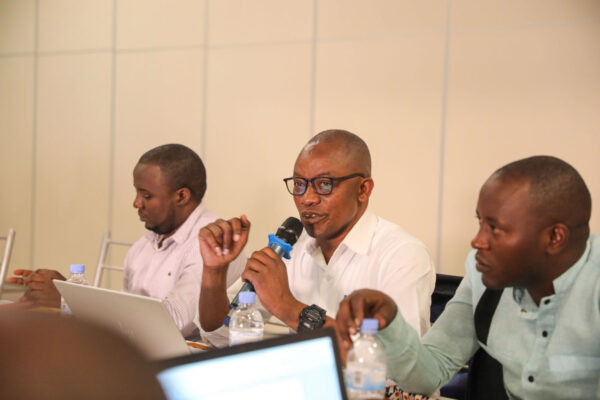
Interpeace organised the training workshop in partnership with the Rwanda Media Commission (RMC), the regulatory body for the media sector in Rwanda, responsible for building its capacity. Emmanuel Mugisha, RMC’s Executive Secretary, commended the partnership with Interpeace for organising this training. He further encouraged trained journalists to utilise the skills gained to foster their professionalism and fulfil their role as the fourth estate.
“We believe in your capacity and power to drive change. Therefore, we anticipate an increase in stories, documentaries and programmes that educate Rwandans about mental health and advocate for a strong and decentralised mental health system. This training lays the foundation for a strong and fruitful partnership between Interpeace and the media sector in promoting MHPSS and peacebuilding in Rwanda,” said Mugisha.
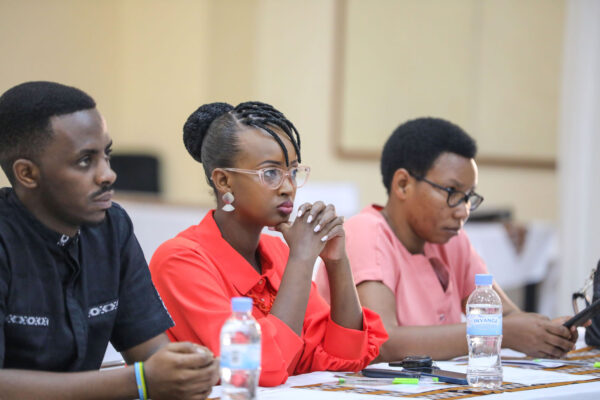
We are deeply saddened to learn of the passing on 16 October 2023 of the former President of Finland and Nobel Peace Prize laureate Martti Ahtisaari, who was also the Chair of Interpeace’s Governing Board from May 2000 through December 2009.
“President Ahtisaari will be greatly missed not only by his family but by all of us in multilateral diplomacy. Interpeace joins the international community in mourning his passing and I personally salute his achievements,” said Amre Moussa, Chair of the Interpeace Governing Board.
“Martti joined the global Governing Board in a period of political upheaval in the peace and security landscape. Throughout his chairmanship, lasting nearly 10 years, his wisdom, insight and advice were instrumental in shaping the vision, mission and way forward for our organisation. His commitment to our values and peacebuilding programmes around the world was always enthusiastic and thoughtful,” said Matthias Stiefel, Founder and Vice-Chair of Interpeace.
“The world has lost a great international statesman today. Above all the accolades, President Ahtisaari embodied humility and a sense of what is just. Martti rooted his vision and pursuit of peace in universal human values. History books will tell of his extraordinary contribution to the advancement of peaceful cooperation within and between states and societies affected by conflict,” said Itonde Kakoma, President of Interpeace.
From everyone at Interpeace – our Governing Board and our staff – we extend our deepest condolences to President Ahtisaari’s family, friends and colleagues from his many walks of life. We especially extend our heartfelt sympathies to colleagues and friends at CMI – Martti Ahtisaari Peace Foundation.
We will remember him for these timeless words, which he delivered when accepting the Nobel Peace Prize in 2008: “Peace is a question of will. All conflicts can be settled, and there are no excuses for allowing them to become eternal.”

